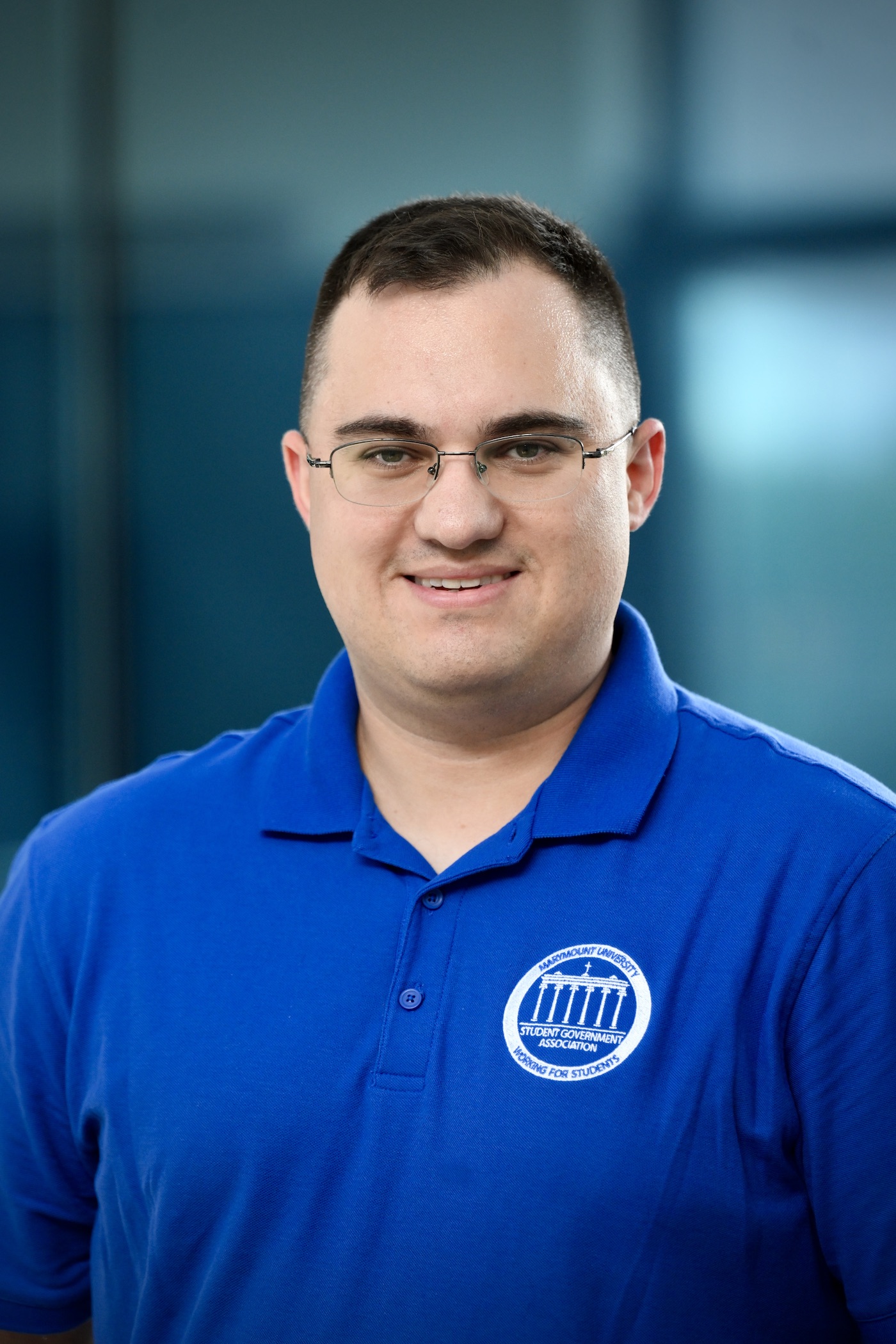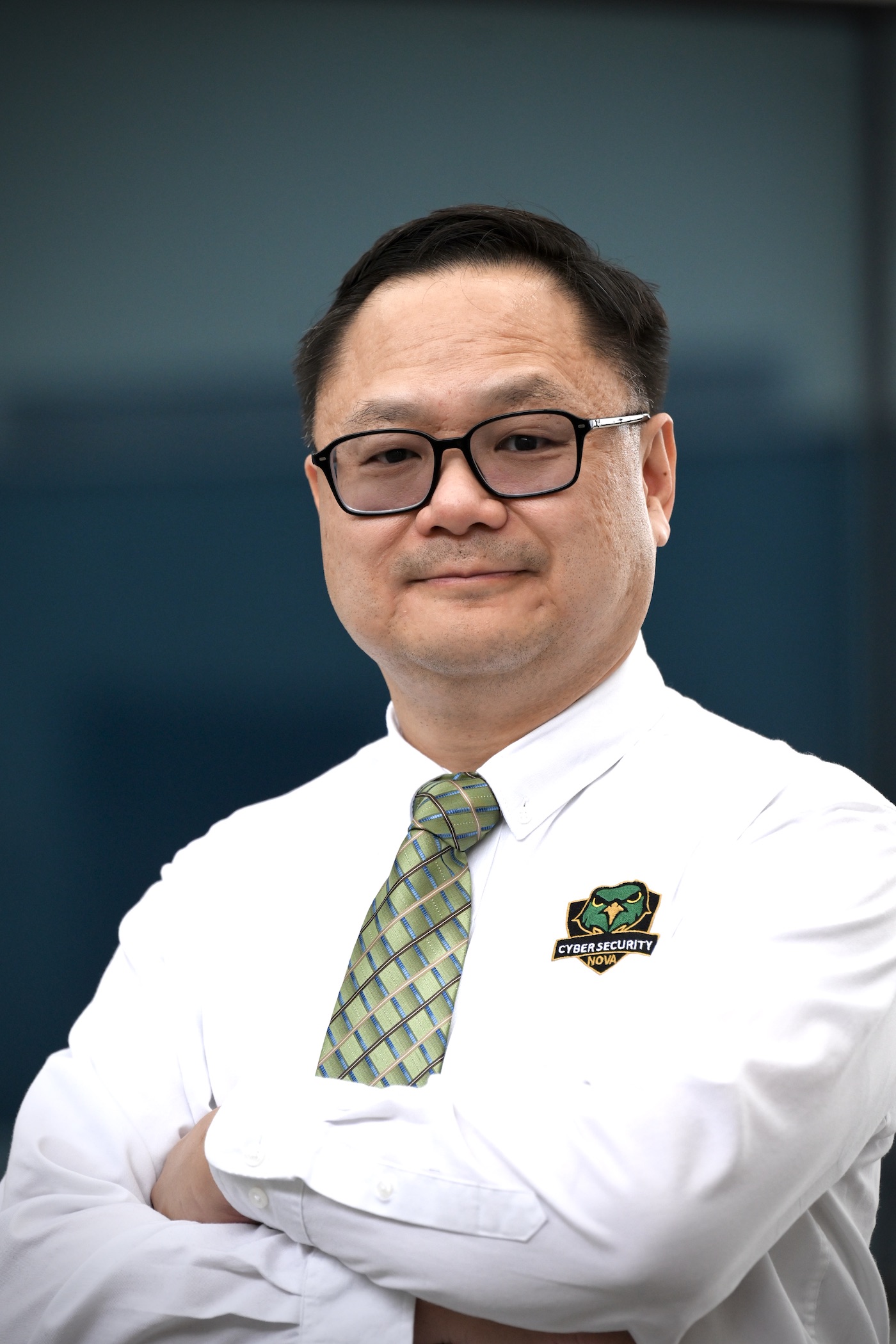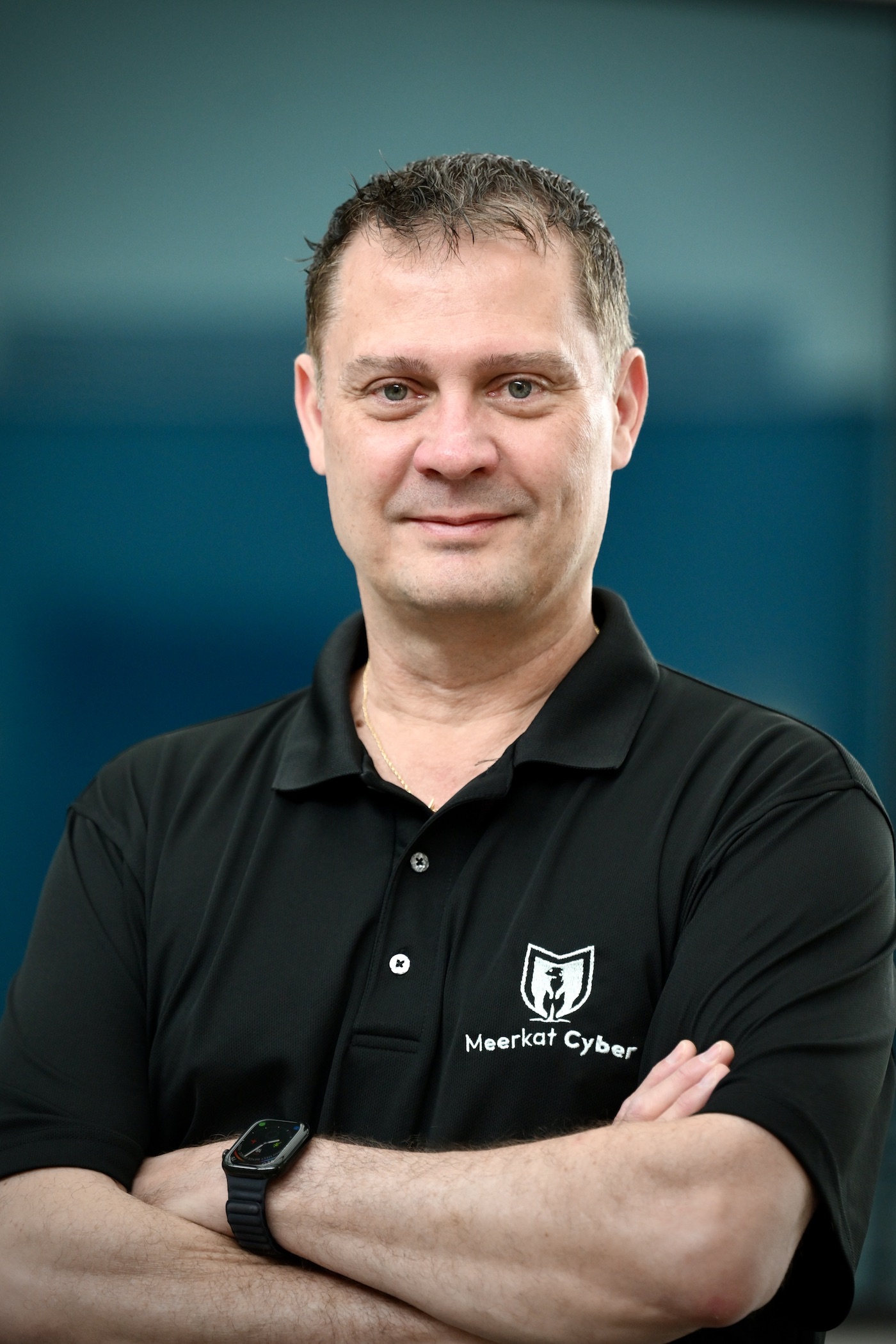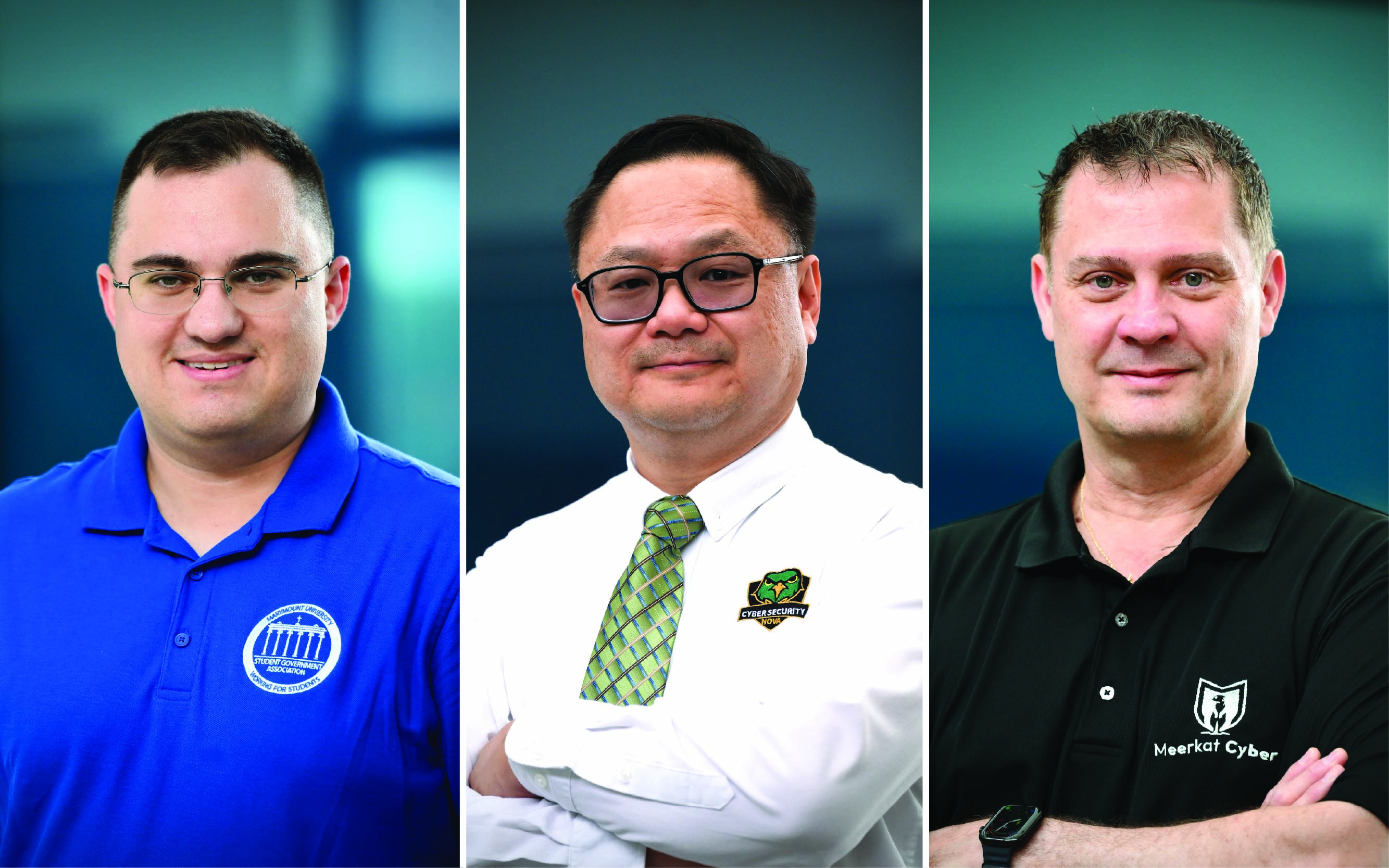FEATURING
Student Spotlight: Richard Flores
Faculty Spotlight: Professor Mike Hon
Industry Spotlight: Meerkat Cyber - Government-Level Cybersecurity Solutions

“NOVA IT courses did a great job teaching the fundamentals of IT and cybersecurity. I’ve noticed I have a strong understanding of how networking protocols work and the bigger picture. The education is great, with small class sizes and a variety of professors to choose from.”
Air Force veteran Richard Flores graduated from NOVA in 2023 with an associate degree in Information Technology. He’s currently enrolled in two additional NOVA courses: ADJ 100 – Survey of Criminal Justice and ITN 267 – Legal Topics in Network Security.
He is pursuing a Bachelor of Science in Information Technology with a concentration in Cybersecurity at Marymount University, along with minors in Digital Forensics and Cloud Computing. Richard also serves as a cybersecurity research lead for Marymount’s CyberClinic and is spending the summer interning with ECS, a company that delivers advanced technology, science, and digital transformation solutions.
Richard’s journey began in 2014, when he first enrolled in NOVA’s computer science program. After several semesters, he realized it wasn’t the right fit—particularly due to the heavy math requirements, such as calculus. He then explored emergency medicine for a semester and worked in retail, repairing electronic devices. Eventually, his passion for computers, especially networking and hardware, led him back to NOVA to pursue an IT degree.
“I didn’t know what I wanted to do in the IT field until I took ITN 262 – Network Communication, Security, and Authentication with Professor Mike Hon,” he says. “He introduced digital forensics and analysis, which really sparked my interest. I wanted to take his VISA Payments Cybersecurity Certification summer class, but it conflicted with my schedule,” he adds.
Another influential course was ITN 260 - Network Security Basics. NOVA covers the cost of CompTIA Security+ certification for students who earn an A or B in the class. This course helped Richard land his current role with Marymount’s CyberClinic.
He first learned about Marymount during a NOVA transfer day. He was drawn to the university’s smaller campus, low student-to-faculty ratio, and engaging faculty, including Dr. Alex Mbaziira, director of the School of Technology.
Richard served in the Air Force for four years in security forces. He began as a patrolman and later became a dispatcher—roles that, he notes, share similarities with cybersecurity. “I learned about digital forensics in the Air Force,” he says. “I taught Iraqi police how to conduct sensitive site exploitation involving electronic devices. Sometimes we’d have to try and access them in the field. Many people with military backgrounds—especially those in investigation, law enforcement, and security—transition well into cybersecurity. The physical concepts transfer to the digital world; you just have to think about them differently.”
Richard’s Advice for Prospective Cybersecurity Students:
- Compete in cybersecurity challenges like Capture the Flag (CTF) competitions
- Pursue internships
- Conduct research with professors or on your own
- Complete NOVA’s program and earn credentials
- Don’t just attend class—get involved. Those who engage outside the classroom are landing more interviews
- It’s never too late to go back to school
- Consider transferring to Marymount University, especially if you have a military background
Richard plans to graduate from Marymount in December. Looking ahead, he may pursue a master’s degree in cybersecurity. He’s particularly interested in cyber defense and blue teaming and hopes to eventually work for the government.

“NOVA provides opportunities to explore what cybersecurity truly is—beyond the hype and misconceptions online. Students who are eager to learn and push their limits will grow in ways that prepare them for future challenges.”
Mike Hon, assistant professor and head of the IET department at NOVA’s Alexandria Campus, brings a rich background in IT and over 27 years of teaching experience at NOVA, UVA, and GMU. With a professional history spanning law enforcement and intelligence work, Mike specializes in computer forensics and ethical hacking.
“In over 27 years of teaching at NOVA, I’ve seen the importance of exchanging ideas and collaborating with people from diverse strengths, backgrounds, and perspectives. I was drawn to NOVA’s inclusive environment and the opportunity to share what I’ve learned.”
He emphasizes the strength of NOVA’s accredited cybersecurity program, which combines rigorous coursework with hands-on experience. Alumni frequently cite the program as giving them an edge—whether transferring to four-year institutions or entering the workforce.
One example is Richard Flores, an Air Force veteran and recent NOVA graduate who earned an Associate of Science in IT in 2023. He is now pursuing a bachelor’s degree in IT at Marymount University, with a focus on cybersecurity and minors in digital forensics and cloud computing. He also serves as a cybersecurity research lead at the university.
Courses such as Ethical Hacking, Cyber Law, and Forensics blend theory with practical exercises that develop both critical thinking and technical expertise. Students use industry-standard tools like Wireshark for malware analysis and Autopsy for digital forensics.
The program introduces a broad range of tools and platforms, including the Virginia Cyber Range, Cisco networking software, Raspberry Pi, and forensic imaging equipment. Students explore career paths in help desk support, hardware technology, data center operations, and digital forensics. Many graduates continue their education, while others step directly into roles at leading companies, often progressing from interns to full-time employees.
To support this transition into the workforce, NOVA partners with AWS, Digital Realty, and VISA to provide students with firsthand exposure to real-world cybersecurity and fintech environments. In addition to CompTIA and AWS certifications, NOVA now offers the VISA Payments Cybersecurity Certification—developed in partnership with VISA and taught in part by Mike. Students have toured the VISA campus and applied for internships and apprenticeships.
To keep the curriculum relevant, Mike draws from his ongoing work as a cybersecurity architect, continually adapting course content to reflect technological shifts and societal needs. Students investigate real-world vulnerabilities in everyday devices—such as smartwatches and home cameras—and analyze malware in virtual detonation chambers to safely observe behaviors and extract indicators of compromise.
He’s also an IEEE-published author and currently leads a nonprofit team focused on cloud security, FedRAMP, data forensics, and big data analytics.
Mike believes successful cybersecurity students are curious, collaborative, resilient, and grounded. Those chasing shortcuts or quick rewards often falter. He advises students to reflect on their goals, manage their time wisely, and maintain balance across school, work, and life.
His guidance: “Know your strengths and weaknesses. Take smart risks. Use time blocking to stay on track. Have backup plans. Most importantly, find something that keeps you learning.”
He encourages students to explore emerging trends like generative AI, drone forensics, and gait analysis, noting that even advanced topics such as quantum computing warrant early attention to prepare for future challenges.
For Mike, preparing the next generation of cybersecurity professionals goes beyond technical training. “We need deeper learning—and employers willing to support skills-based hiring. That’s how we build tomorrow’s talent pipelines.”
At NOVA, students engage in realistic scenarios like packet capture analysis, assuming the role of digital investigators. This analytical mindset—blending problem-solving with teamwork—is central to their success. A favorite assignment: uncovering forensic evidence in drone footage.
Through cutting-edge tools, applied learning, and strong industry partnerships, Mike and the NOVA cybersecurity team are equipping students not just with skills—but with the mindset to lead, adapt, and secure the digital future.

"I come from the technical side of IT, and I used to think cybersecurity was all about the latest tools, software developments, or security programs you run on your computer. While those are important, they’re really only half the equation—the other half involves people and policy. The key opportunity for students is to introduce them to that broader scope early on.” — John Richards, Co-Founder, Meerkat Cyber
The Department of Defense (DoD) created the Cybersecurity Maturity Model Certification (CMMC) Program to protect sensitive government data, such as contractor records and confidential project details. This program ensures that companies working with the DoD follow strict security guidelines throughout their contracts.
This initiative has opened new doors for cybersecurity firms like Meerkat Cyber, which specializes in training and guiding companies through the certification process. Led by Chris Haigh, John Richards, and Daniel Stark, Meerkat Cyber helps contractors understand and meet the necessary security requirements.
“We conduct required assessments for companies handling sensitive government information,” explains Chris. “These assessments are pass/fail, and only professionals with specialized certifications—Certified CMMC Professional (CCP) and Certified CMMC Assessor (CCA)—are qualified to perform them.”
Many contractors need expert guidance to prepare for certification. However, due to strict rules, assessors cannot provide both advisory services and official evaluations.
“That said, we're known for being one of the most skilled teams when it comes to guidance,” Chris says. “Some advisors rely on basic certifications or self-study, but their expertise varies. We believe that deep knowledge and real-world experience make all the difference.”
Opportunities in Cybersecurity
Meerkat Cyber encourages individuals interested in cybersecurity to explore the field. With nearly 400,000 companies working with the DoD, there is a growing demand for professionals who can conduct security assessments and ensure companies meet government standards.
At NOVA, students can start their cybersecurity careers with a one-year Career Studies Certificate, which prepares them for industry-recognized Security+ and CISSP certification exams. The associate degree program helps students earn four additional certifications that boost their job prospects.
“Those are excellent certifications,” Chris says. “For those just starting out, Security+ is one of the best options. It’s great that NOVA offers it. CISSP is also a valuable certification for career advancement.”
Best Pathway for Students
Which certification should students focus on first?
“I recommend starting with the CCP certification because it opens the most doors. Later, students can pursue the CCA if they choose,” Chris explains. “The DoD no longer requires a college degree for these certifications, but they do recommend either a cybersecurity or IT degree, or at least two years of experience in the field.”
To earn either certification, students must complete a 40-hour interactive course taught by a certified instructor using DoD-approved materials.
“I’m a certified instructor for both CCP and CCA, and I’ve written course materials that I can personally recommend,” Chris adds.
For more information, visit Meerkat Cyber.
